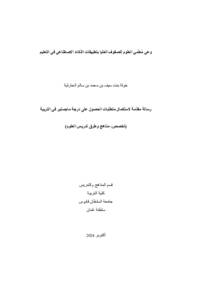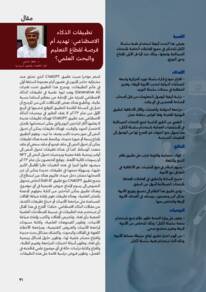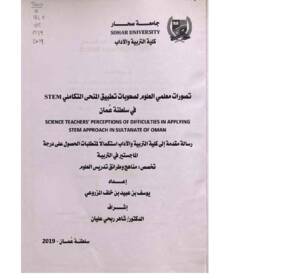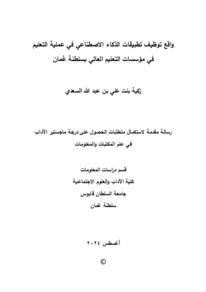Document
وعي معلمي العلوم للصفوف العليا بتطبيقات الذكاء الاصطناعي في التعليم.
Source
رسالة ماجستير
Other titles
The level of awareness among upper-grade science teachers about the applications of artificial intelligence in education
Country
عمان
City
مسقط
Publisher
جامعة السلطان قابوس
Gregorian
2024
Language
Arabic
Thesis Type
رسالة ماجستير
English abstract
The present study aimed to measure and elucidate the level of awareness among
science teachers in advanced grades, regarding the utilization of Artificial Intelligence
(AI) within educational settings. To address the research questions posed, the study
employed a sequential explanatory mixed-method design, consisting of two phases:
the initial quantitative phase involved developing an awareness scale for AI
applications, that encompassed three dimensions representing awareness in the fields
of knowledge, skills, and attitudes. This scale was then administered to a random
sample of 173 science teachers from grades 10 to 12. The quantitative findings
demonstrated that science teachers exhibit a moderate level of cognitive awareness
and a lower level of skills-based awareness. Concurrently, the results recorded
significantly positive attitudes towards the integration of AI applications in education.
Furthermore, the statistical analysis revealed that neither scientific specialization nor
teaching experience significantly influenced teachers’ level of awareness. However,
the analysis confirmed that awareness levels was significantly affected by variables
such as gender and participation in training courses. The qualitative phase was
predicated on interpreting the quantitative findings and further elaborating the results
through focus-group interviews conducted with a selected subset of the initial sample,
consisting of 24 participants. The interview data revealed that the moderate level of
cognitive awareness arises from an interaction between intrinsic developmental
motivations and filed- specific barriers. Conversely, the limited skills awareness is
attributed to a combination of psychological, social, technological challenges,
alongside educational and organizational obstacles. Additionally, interviews data
indicated that the positive attitudes stem from the teacher’s belief that AI applications
stimulate educational performance and support curricula and teaching methods,
thereby enhancing educational efficiency. Moreover, the differences in awareness
levels between gender were interpreted as due to variance in human nature, time
availability, and social influences. In terms of training, science teachers affirmed to
the effectiveness of training courses in fostering awareness of AI applications in
education. Based on the results obtained, the study recommends designing practical
awareness programs; designed to cultivate comprehensive awareness of AI
applications among teachers, along with the implementation of policies that facilitate
the integration of intelligent applications into the educational system
Arabic abstract
هدفت الدراسة الحالية إلى قياس وتفسير مستوى الوعي لدى معلمي العلوم في الصفوف المتقدمة، فيما يتعلق باستخدام الذكاء الاصطناعي (AI) في السياق التعليميي. وللإجابة عن الأسئلة المطروحة اعتمدت الدراسة الحالية إلى المنهج المزجي ذي التصميم التفسيري التتابعي، الذي تضمن مرحلتين : أولاهما مرحلة جمع البيانات التي شملت تصميم مقياس للوعي بتطبيقات الذكاء الاصطناعي وتطبيقه على عينة عشوائية من 173 معلمًا ومعلمة وتضمن المقياس المعد ثلاثة محاور مثلت الوعي في ثلاثة أبعاد رئيسة هي: المعرفي والمهاري والوعي الوجداني المتمثل في الاتجاهات. وقد أظهرت النتائج الكمية أن معلمي العلوم يمتلكون مستوى متوسطًا من الوعي المعرفي ومستوى منخفضا من الوعي المهاري. وفي الوقت نفسه، فيما سجلت اتجاهات إيجابية ذات دلالة مرتفعة نحو دمج تطبيقات الذكاء الاصطناعي في التعليم.
Category
Theses and Dissertations







